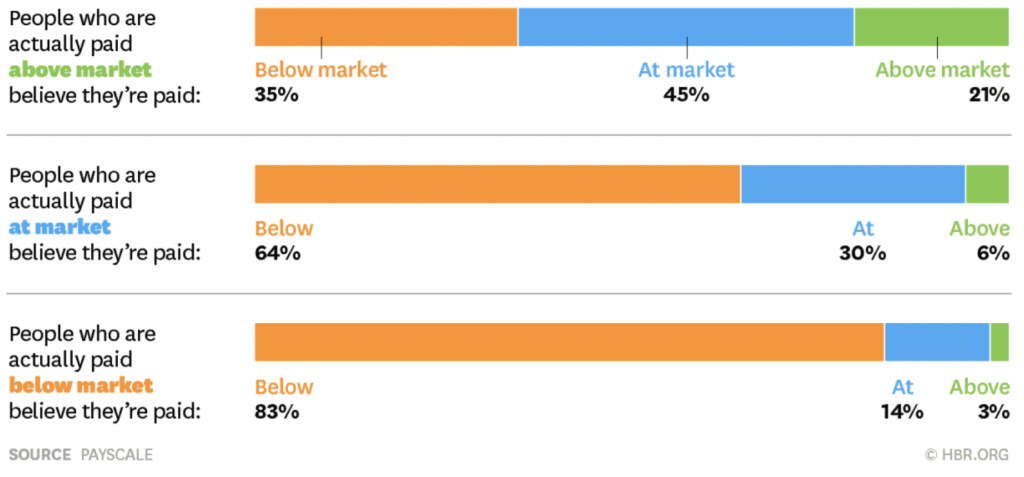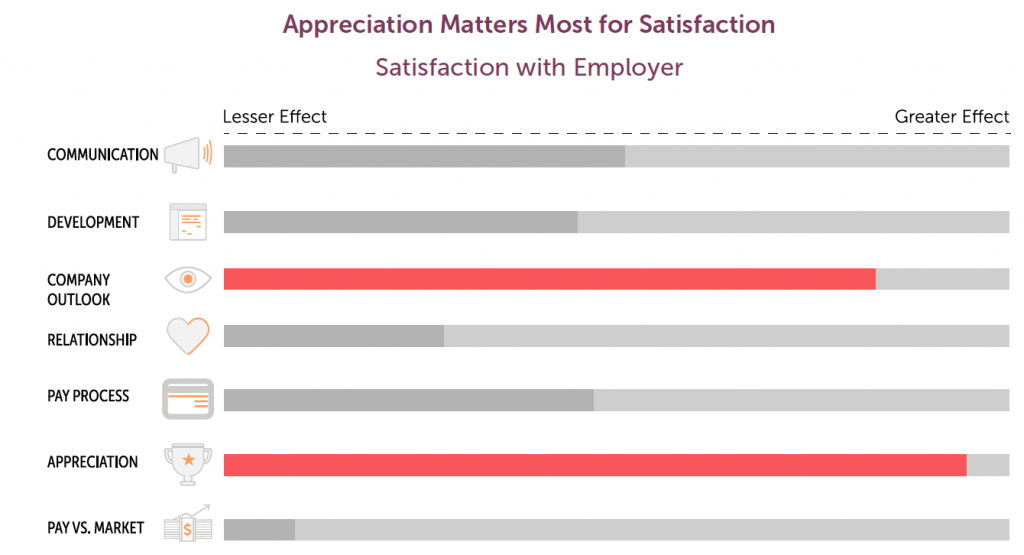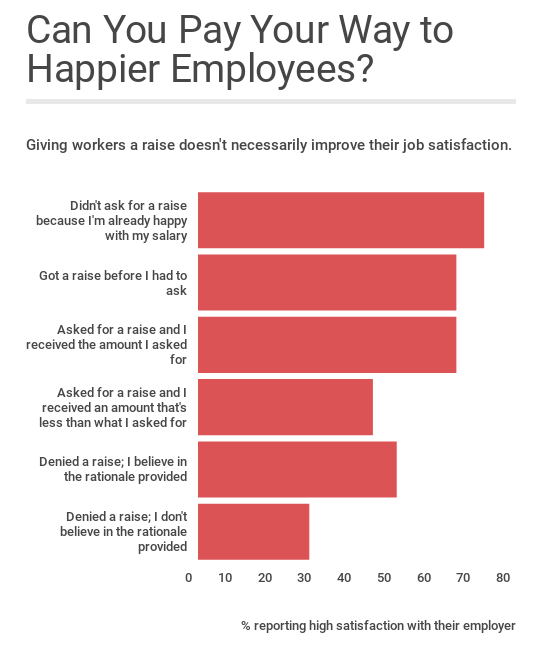Here at PayScale, we conduct ongoing research to understand the complicated relationship between compensation, how people feel about their salary and the many other factors that impact employee satisfaction.
Over and over again, we’ve learned that nearly no one is happy with their salary, and most people think they’re underpaid. Meanwhile, Gallup’s 2018 employee engagement survey shows that more than half of US workers are not engaged at work. Getting pay right has become increasingly important in today’s competitive marketplace. And yet, research shows that spending more on payroll (comp and benefits) does not guarantee happy employees or necessarily move the dial on retention.
So what can employers do to ensure they are being smart with their dollars and help employees feel more satisfied with their compensation and their jobs overall?
Below, we’ll share key findings from several years of research (our own and others) to help you unpack the nuanced relationship between compensation and employee satisfaction. Here are the topics we’ll cover:
- How employees feel about their pay
- What has the greatest (and least) influence on employee satisfaction?
- Why people quit their jobs
- Pay raises: Do they foster happier employees?
- Employee satisfaction vs. your bottom line
- What you can do now to improve employee morale and their job satisfaction
How employees feel about their pay
Most people think they’re underpaid and very few people are satisfied with the salary they receive.
In 2015, PayScale surveyed 71,000 employees. The study results reviewed that one of the top predictors of employee sentiment, including “satisfaction” and “intent to leave,” was the company’s ability to communicate clearly about compensation.
First, we found that perceptions about pay don’t always reflect reality, even if employers are paying the same — or more — than similar companies. In fact, two-thirds of people who are being paid at market believe they’re actually underpaid. Also, over a third of people who are paid above market still think they’re paid below market.
The second finding was this: Perceptions about pay play a significant role in an employee’s desire to leave your company. For example, 60% of employees who perceived they were underpaid said they intended to leave, compare to only 39% of those who perceive they were overpaid.
Ever since this study came out, we’ve been tracking the way employees feel about their pay. In 2018, we found that just one in five employees think they’re paid fairly.
Part of the reason employees feel poorly about their pay is that pay practices are often shrouded in secrecy. We found that open communication about salary decisions can in fact make someone feel better about their pay. If an employer pays lower than the market average for position, but communicates clearly about the reasons for the smaller paycheck, 82% of employees we surveyed still feel satisfied with their work.
With this study, we established that effective communication about pay decisions mattered to employee happiness. But the way employees feel about their pay isn’t the only thing that causes them to break up with their job.
Key factors that influence satisfaction
In a 2017 study on employee engagement, we decided to test a wider array of factors to see which ones had the greatest effect on employee sentiment and their intent to leave. What we learned is that appreciation matters most: An employee feeling appreciated or unappreciated moves the needle on satisfaction more than any other variable.
Company outlook is second most important, with 87% the strength of appreciation.
Three other variables were roughly half as important as appreciation (but still important): communication ( 53%), pay process (49%) and development (48%).
In the third tier are manager relationship and pay vs. market. Pay vs. market is the least important variable in terms of employee satisfaction, affecting employee satisfaction only 9% as much as appreciation.
Again, we learned that one’s actual pay matters little to how one feels towards their employer. The perception of fair pay (a result of establishing transparent pay communication and sound processes) has 5.4 times as much impact on employee satisfaction versus how well they are paid.
Why do people quit?
In the same study, we also looked into why people decide to quit their jobs.
Here we found that company outlook is by far the biggest driver of intent to leave. This makes sense, as there’s nothing as dire as when an employee loses faith in their organization and its leaders. The lack of appreciation and lack of growth opportunities took the second and third spots.
We also found that pay process has a greater impact on one’s decision to quit than other things, including one’s pay versus market, quality of relationship with manager and the presence of effective communication.
At the time of this writing, we’re in the middle of another study to dig even further into why people decide to seek new positions outside their current organization. This time, we surveyed people who are evaluating new job offers and asked them to pick just one reason for leaving their current employer. They could choose from among several reasons.
Although we don’t have final data yet, we’ve found that wanting higher pay is by far is the top reason people are calling it quits. What’s interesting is that wanting higher pay holds up as the top reason for all income levels.
Why are people so easily swayed by higher pay — even when they already make a decent wage? The data suggests that it’s because people aren’t all that engaged in their work.
In fact, Gallup’s 2018 employee engagement survey found that 53% of all workers in the US are not engaged. Essentially, this is saying that over half of U.S. workers are just showing up to get their paychecks. When we have such a large portion of the workforce that’s not engaged — it’s no surprise that they are quick to switch jobs when somebody offers them a bigger paycheck.
Now, you’re probably wondering: What can you do to help employees become more engaged or re-engage with their work? Is giving someone a raise an effective way to improve their morale and job satisfaction?
Those were the questions we sought to answer with our 2018 “Raise Anatomy” study.
Can you pay your way to happier employees?
Earlier this year we surveyed over 160,000 people about their experience with asking for a raise from their current employer. The study results revealed that giving employees more money won’t necessarily make them feel better about staying in your organization. How satisfied employees feel has a lot more to do with when you reward them, and how you communicate your decision for that reward.
We found that the most satisfied group of employees are those who haven’t asked for a raise because they’re already happy with their salary (72% of this group said that they’re highly satisfied with their employer).
The next happiest group of employees are the ones who haven’t asked for a raise because their employer gave them a pay bump before they had to ask (65% of employees in this bucket reported being highly satisfied with their employer).
What about people who asked for a raise and received one?
With this group, their sentiment with their employer really depends on whether they got exactly what they wanted. 65% of those who who received the amount they asked for report being highly satisfied with their employer. Yet 44% of those who received a raise but for less than they asked were satisfied with their employer.
And here’s the biggest surprise: Not everyone who was denied a raise was unhappy.
When workers are denied a raise, but they believed the rationale their employer provided, half of these “believers” still report being satisfied with their employer. On the other hand, when workers are denied a raise but they didn’t believe in the provided rationale, just 28% reported being satisfied with their employer.
Our findings suggest that the answer to making your employees feel better about working at your organization isn’t to give them more money. Money certainly helps, but it needs to be delivered at the right time, with thoughtful communication, with an acknowledgement of the employee’s contributions. Doing all of those things together is the key to make sure employees feel truly valued.
Other researchers have found evidence that corroborates our own findings.
Joseph Folkman — researcher and founder of two leadership development firms — looked at satisfaction with pay and benefits in Zenger Folkman’s leadership database for more than 60,000 employees. He found seven factors that all have a significant positive influence in helping people feel more satisfied with their compensation. They include recognition, getting pay increases that are tied to achieving specific goals and objectives, working on projects that help them develop new skills, feeling good about the reputation of their employer, and receiving regular communication from management about how pay decisions are made and why they’re made the way they are.
Employee satisfaction correlates strongly with financial success
Why does employee satisfaction matter so much? You know the common answers: Happier employees are more productive, committed, innovative, they stay longer, etc.
Researchers at the Drucker Institute discovered that companies that focus on employee satisfaction have better results all around, including higher measures of customer satisfaction, higher measures of innovation (e.g. number of products released, patents) and better financial results.
At the Drucker Institute, a team of researchers studied 693 publicly traded companies in 2017 to see what makes effective companies effective across five areas of performance: employee engagement & development, customer satisfaction, innovation, social responsibility and financial strength. Their hypothesis is that each of these five areas would be highly correlated, or rise and fall together to a substantial (that is, to a statistically significant) degree. For example, that financial strength would show a statistical relationship with employee engagement and development.
What they found is that their original hypothesis was correct. When they looked across 693 companies in their rankings last year, they found a high degree of correlation among all five areas of performance.
In short, just as the human body needs all parts to function well — the circulatory system, the nervous system, the bone structure and more — a corporation needs all of its major dimensions (customer satisfaction, employee engagement and development, innovation, social responsibility and financial strength) to be healthy and resilient.
This research also looked at companies over time to see which area of performance, if improved or neglected, would have the biggest impact on each company’s total effectiveness score. Research showed that many of the biggest gainers in total effectiveness were propelled by a substantial swing in their employee score. And many of the biggest losers were hit by significant drop in their employee score.
Put it another way, if you’re trying to figure out where to focus first, analysis suggests that you can’t go wrong by taking good care of your people.
How to improve employee morale and job satisfaction
To recap all that we’ve covered, here are the seven things you will need to focus on to increase your employees’ job satisfaction.
- Be transparent with employees about how you make salary decisions
- Show your employees that you appreciate them; be timely and specific when giving people recognition
- Reward employees with monetary incentives when they produce results, ideally before they ask you for a raise
- Give people meaningful, challenging work so they can grow
- Compare your salary ranges to the market on a regular basis and make timely adjustments
- Audit your pay practices from a gender/ethnic pay equity perspective; address any issues you find immediately
- Be clear about who you are, your purpose and your values. Make sure your employees know these values and live them every day.
